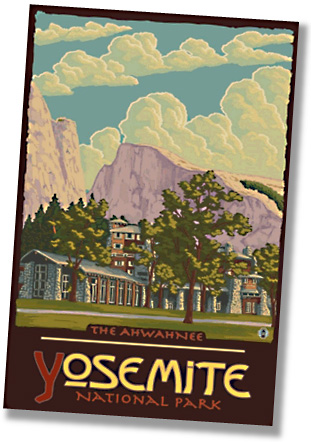I wrote a post yesterday about a New York company that claims it owns the trademark to various locations at Yosemite National Park. Based on the story I read, this seemed obviously outrageous, and that was the tone I took.
But that was probably wrong. I ended up looking into this issue a little more deeply, and it turns out that the whole thing goes back several years and  is actually a fairly pedestrian contract dispute. Here’s a quick outline of what happened:
is actually a fairly pedestrian contract dispute. Here’s a quick outline of what happened:
- In 1993, the National Park Service put up the concessions at Yosemite for bid. The winner was Delaware North, which was required to buy the assets of the Curry Company as part of the deal. This included the Ahwahnee Hotel, Camp Curry, and several other pieces of property.
- In July 2014 the concessions were once again put up for bid, with the winning bidder required to pay Delaware North fair market value for the assets it owned. The real property had been turned over to the government after the 1993 deal closed, but there was still the matter of “other property.”
- The Park Service initially valued the “other property” at $22 million. In December 2014 it increased its valuation to $30 million, which included an estimate of $3.5 million for intangible property. Of this, $1.63 million covered trademarks and other intellectual property.
- Delaware North disagreed with this assessment. It valued “other property” at about $100 million, which included an estimate of $51 million for intangible property. Of this, $44 million covered trademarks and other intellectual property.
- Delaware North filed a protest with the GAO over the Park Service valuation, but in April 2015 the GAO dismissed the protest.
- June 2015 Aramark won the Yosemite contract.
- In September 2015 Delaware North took the case to court.
And that’s pretty much where we stand today. It turns out there’s nothing inherently outrageous about Delaware North owning some of these trademarks, as even the Park Service admits. “We have not denied the fact that they do own intellectual property,” said Scott Gediman, a spokesman for Yosemite National Park. “But with these trademarks, it’s kind of two issues: One, are these trademarks valid, and, two, what is the value of them?” So this is a pretty routine contract dispute. Which trademarks are legit and which aren’t? Did Delaware North acquire these trademarks “surreptitiously” or with the knowledge of the Park Service? And how much are they worth? Delaware North says they’re worth $44 million. The Park Service says they’re worth $1.63 million. The issue is now in court, and Delaware North says it has offered to allow Aramark free use of the trademarks until the dispute is settled. Yesterday, however, the Park Service announced that it would simply rename everything and make the case moot.
It’s quite possible that Delaware North’s valuation is absurdly high. That’s my guess, since the value of these trademarks is mostly due to being attached to Yosemite Park, not to anything special that Delaware North has done to create or exploit them. But I’m no lawyer and I don’t know. That’s for a court to decide.















